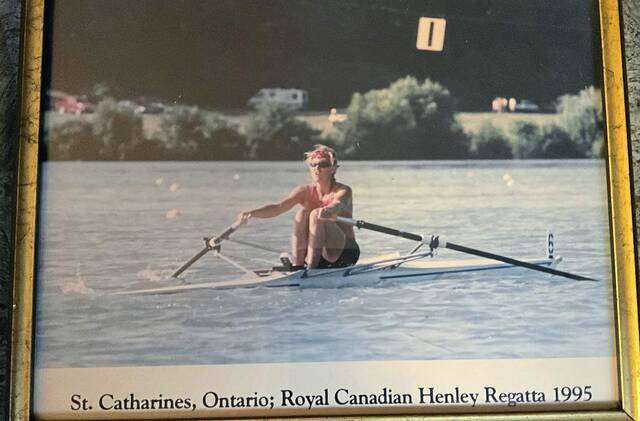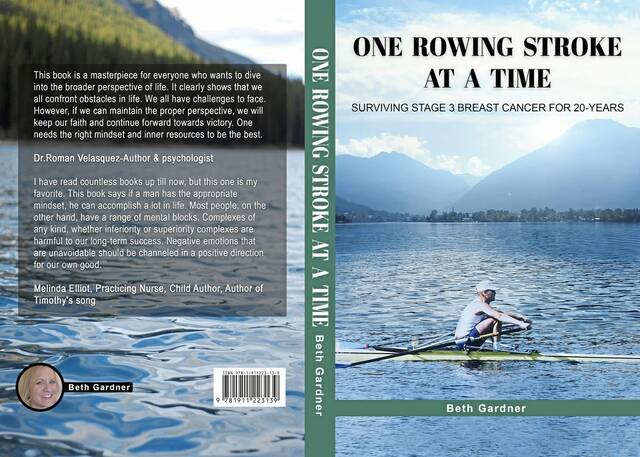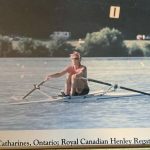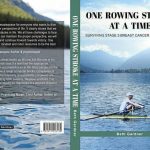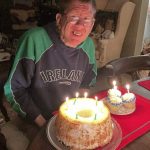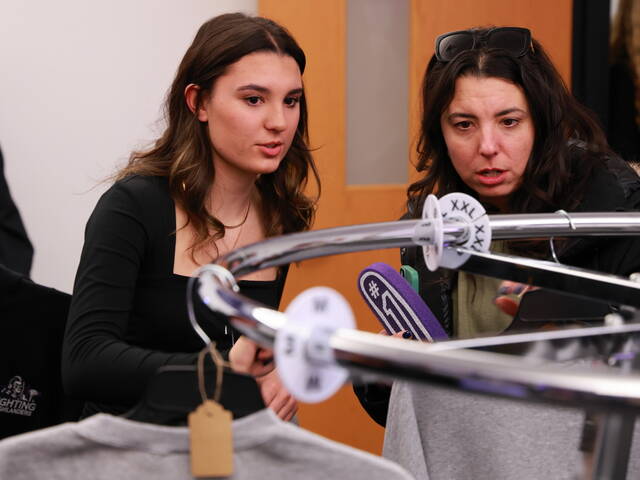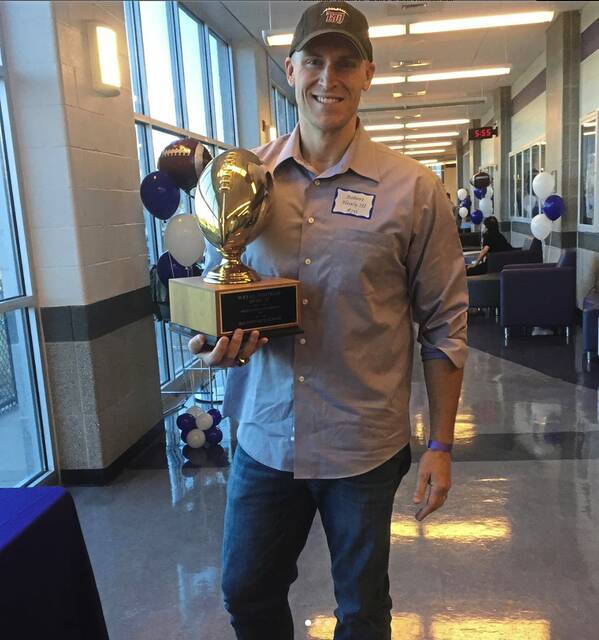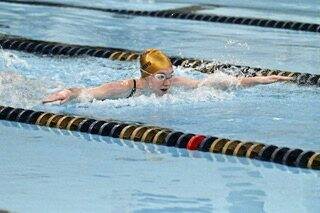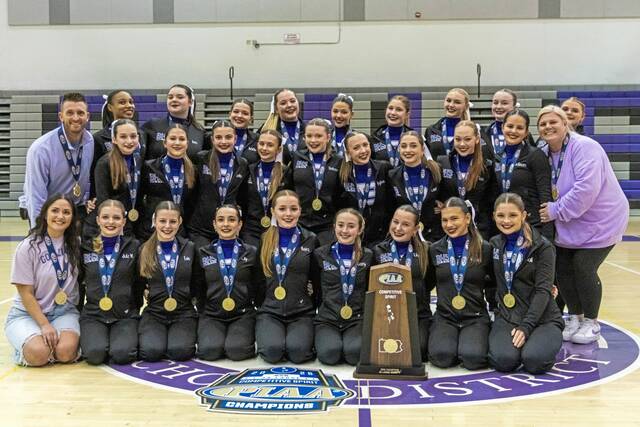Beth Gardner looked up to her older brother, Todd.
Born with cerebral palsy, scoliosis and a collapsed left lung, he leaned when he walked. He wore back and leg braces and had a speech impairment, making it hard for people to understand him.
He died last year from a fall. He was 57.
“All of his challenges that I watched him struggle with throughout life were of inspiration for me regardless of any goal I set after,” said Gardner, 51, a cancer survivor. “In fact, because of having watched him struggle with so many handicaps throughout life, I had no excuse but to persevere through my cancer treatments the best way that I knew how to. He was my hero and role model.”
Gardner, of Scott, who grew up in Mt. Lebanon, wants to be an inspiration like her brother for others enduring a cancer diagnosis. During treatment, oncology nurses encouraged her to keep a journal.
She has chronicled her medical journey in “One Rowing Stroke at a Time: Surviving Stage 3 Breast Cancer for 20 Years,” a self-published book.
“Returning to everyday life once you are diagnosed with a life-threatening illness is not as straightforward as it may appear,” she said. “Once you’ve been diagnosed with cancer, you can quickly lose hope. It’s a long recovery bridge and countless hours from hospital to home.”
The words came from her daily writings that began the day she was diagnosed — a month after her 30th birthday.
Gardner started writing the book in 2001. She hadn’t made it to the five-year remission mark, so she waited. She decided it was time to work on publishing the manuscript in March 2020.
“I knew how challenging it was trying to work and go to chemotherapy and radiation treatments when there wasn’t a pandemic,” she said. “I couldn’t imagine having to do it all during a pandemic.”
The pages guide the reader by offering tips on how to deal with psychological side effects and stress. She writes about listening to your body and that hard times introduce you to loyal friends. Her faith led her. She said it helped her to do her best to stay positive.
There was no family history of breast cancer.
Gardner chose the book title because she competed in rowing — a sport that she said parallels life.
Rowers learn it takes one stroke at a time to reach the finish line. They are responsible for funding their athletic wear, their own boat and travel costs. She hadn’t heard of the sport until 1992. She was working at the beach in Stone Harbor, N.J., as a waitress and in retail.
“So many people asked me if I did crew,” said Gardner. “I said I knew about (the clothing brand) J.Crew, but that’s not what they meant.”
When she returned to Drexel University in Philadelphia that fall, she noticed signs about rowing.
“I fell in love with rowing at the first practice,” she said. “I come from a water-loving family. I see older people with walkers who get in a boat and their eyes light up the minute they are on the water. Water can light up the human spirit.”
Coach Mamie Doyle submitted Gardner’s rowing scores to the U.S. National Team governing body and she was invited to a team camp.
“I was grateful that she saw potential because I was not familiar with the post-college rowing lifestyle,” Gardner said.
The pre-elite sweep rowing camp was held in the spring of 1994 in Chattanooga, Tenn. Sweep rowers use one oar. Athletes with two oars — one in each hand — are called scullers. She did both forms of rowing.
She trained under then-U.S. National Team coach Hartmut Bushbacher, a former German national team rower, and Tom Terhaar, another U.S. national team coach. In the fall of 1994, she returned to Philadelphia to train. She met Ukrainian coach Igor Grinko.
“I was burning the candle at both ends,” she said. “I put too much pressure on myself.”
She retired from the sport in December 1999.
“I ‘hung my oars up,’ as they call it,” she said.
She had discovered a lump in her breast while training for the Philadelphia Marathon – but she wasn’t allowed to run.
She said it was hard for her to give up on the dream of running the marathon but there was no negotiating with her surgeon, Dr. Dahlia Sataloff at Pennsylvania Hospital. Gardner had a lumpectomy in November 2000.
She did chemotherapy on weekends so she wouldn’t miss work at her job in the investment industry in New York City. She did radiation on her lunch break.
“I would have not seen the lump back when rowing because my shoulders looked very much like swimmer’s shoulders,” she said. “Once I got into a heavy marathon training program, my body muscular structure naturally leaned out, causing my muscles to shrink in size. “
She moved back to Pittsburgh in 2013.
The simplest things, such as getting out of bed and getting dressed, can be challenging for a cancer patient
“Twenty years ago it was still not considered socially appropriate to discuss cancer openly to the public for fear of losing one’s job,” she said. “I could not imagine receiving cancer treatments during a pandemic when I already knew what it was like to go through them without a pandemic. Sometimes in life, you just need a couple of examples of people to give you hope and direction.”
Mike Davidson, an expert for Amazon Pro Hub, an Amazon service provider based in Los Angeles, worked with Gardner on her book.
“It is a completely motivational book,” said Davidson of the 134-page, 30-chapter work. “It is like hope of light in the darkness. To read about how she survived is really inspiring.”
Gardner incorporates rowing strokes as a theme in the book.
“You’ve heard of one day at a time? Well, one rowing stroke at a time seems appropriate since I do use my experience in rowing as an ongoing sub-theme,” she said. “The subtitle just came to me when working with my publishing team. It qualifies the time and degree of cancer.”
“You are not alone if you have been hurting emotionally, psychologically or spiritually due to your cancer treatment,” she said. “If I was having a bad day from cancer treatment I thought my one bad day is my brother’s every day. It puts things in perspective.”


